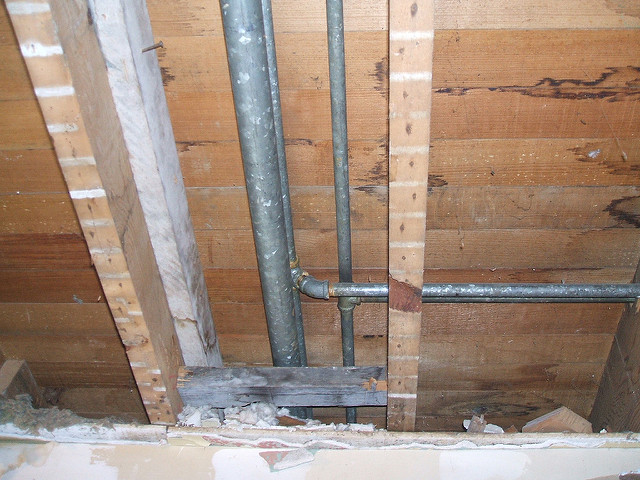How to Examine If Your Residence Has a Concealed Leak
How to Examine If Your Residence Has a Concealed Leak
Blog Article
What're your ideas regarding Hacks to detect leaks?

Early discovery of leaking water lines can reduce a possible catastrophe. Some tiny water leakages may not be visible.
1. Analyze the Water Meter
Inspecting it is a surefire method that aids you uncover leakages. If it relocates, that suggests a fast-moving leak. This means you might have a slow-moving leak that could also be underground.
2. Examine Water Intake
If you identify unexpected changes, regardless of your usage being the exact same, it means that you have leakages in your plumbing system. An unexpected spike in your bill shows a fast-moving leakage.
On the other hand, a steady rise every month, even with the very same routines, shows you have a slow-moving leakage that's likewise gradually intensifying. Call a plumber to completely inspect your property, especially if you feel a warm area on your flooring with piping underneath.
3. Do a Food Coloring Test
When it comes to water consumption, 30% comes from bathrooms. If the color somehow infiltrates your dish during that time without flushing, there's a leakage between the tank and also bowl.
4. Asses Outside Lines
Don't forget to examine your outside water lines too. Should water leak out of the connection, you have a loosened rubber gasket. One small leak can waste heaps of water and also surge your water costs.
5. Assess the scenario and examine
Homeowners need to make it a behavior to check under the sink counters and even inside cupboards for any kind of bad odor or mold development. These two red flags show a leakage so punctual interest is called for. Doing routine evaluations, even bi-annually, can conserve you from a significant trouble.
A lot more significantly, if you know your house is currently old, maintain a watchful eye on your heaters, hose pipes, pipelines and so on. Check for stainings and compromising as a lot of devices as well as pipelines have a life expectancy. They will additionally naturally degrade because of tear as well as wear. Do not wait for it to escalate if you presume dripping water lines in your plumbing system. Call a specialist plumber as soon as possible so you don't wind up with a horrible mess in your home.
Early detection of leaking water lines can minimize a potential catastrophe. Some tiny water leaks might not be noticeable. Examining it is a surefire method that assists you uncover leakages. One little leakage can throw away tons of water as well as increase your water costs.
If you presume dripping water lines in your plumbing system, do not wait for it to rise.
How to Know If Your Home Has a Hidden Leak
Water Meter Reveals Inexplicable Water Usage
If you’d like to test whether or not there’s a leak somewhere in your home, you can do this using your water meter. Here is how to conduct the test:
Don’t use any water in your home for at least 30 minutes; this also means not turning on faucets or water-using appliances.
Go outside, and check your water meter for activity.
If your water meter shows that there was activity, even though no one was using any water, this proves that there is a leak in your home.Visible Mold or Mildew Growth
Leaks behind walls create moist, dark environments that allow mold and mildew to grow and thrive. Eventually, you might see mold growth forming on the wall closest to a hidden leak.
If mold is growing in an area that receives a high amount of moisture, such as a bathroom, it may simply be an indication that better ventilation is needed. However, if you see mold growth on a wall or the ceiling in an area where you would not expect, you probably have a hidden leak.
Musty, Mildew Odor
Sometimes you might not be able to see the mold or mildew that is growing as a result of a leak. However, the smell can give the problem away just as easily. If you catch a whiff of something musty, there’s a good chance that old water is collecting somewhere in your home that you can’t see.
Stained/Warped Walls, Ceilings, or Floors
When your home soaks up water, a variety of red flags can become visible, including ceiling stains, bubbling drywall, warped walls, and sagging floors. While these issues can be caused by excess humidity, they can also be signs that a pipe or plumbing connection has started leaking behind your walls.
Inexplicably High Water Bill
After a while, you get a general sense for what your water bill should be. If you own a pool or sprinkler system, your bill will tend to be higher during summer. However, if you receive a water bill that seems especially high, and you can’t figure out what caused it, then you may have a hidden leak somewhere that’s increasing your bill.
https://www.plumbingjoint.com/blog/2019/july/how-to-know-if-your-home-has-a-hidden-leak/

We were made aware of that report about Leaking water lines through an acquaintance on our other domain. Do you know about somebody who is intrigued by the niche? Why not share it. Thanks a lot for your time spent reading it.
Report this page